Real estate asset management revolves around maximizing a property's potential. It’s an aspect of real estate investing that goes beyond just owning property—it involves managing the asset to increase its value and profitability over time. Moreover, it requires a thorough understanding of market trends and strategic planning to identify opportunities for improvement and growth. The primary goal of asset management is to generate maximum returns while minimizing risks associated with the investment. In practice, this can involve tasks such as property acquisition, improvement projects, lease management, and eventual resale. Utilizing the expertise of real estate asset managers can enable investors to make informed decisions that enhance the performance and value of their assets. In an ever-evolving real estate market, effective asset management can offer a critical competitive edge, ensuring financial growth and stability for investors. A vital part of real estate asset management is portfolio diversification. It reduces risk by spreading investments across various types of properties and geographical locations, thereby shielding the portfolio from potential market volatility. In doing so, it ensures that a downturn in one area does not overly impact the overall portfolio. This also opens up multiple avenues for profit, catering to different market segments. Regular assessment of asset performance helps in identifying areas for improvement, implementing necessary changes, and measuring the results of those changes. This leads to improved decision-making and optimization of returns. Consistent performance assessment provides a clear picture of how the asset is performing against set goals, which then guides adjustments to the property strategy as necessary. Asset managers consider a variety of risk factors, including market and economic trends, potential property damages, and tenant behavior. They proactively work on minimizing these risks to ensure a stable return on investment. By forecasting potential threats and implementing mitigation measures, they help to protect the investment from unfavorable circumstances and secure consistent returns. Efficient property management is a crucial part of asset management. This includes tenant management, property maintenance, and the management of legal aspects like leases and contracts. Ensuring smooth operations on the property level directly affects tenant satisfaction, property upkeep, and ultimately, the investment’s profitability. Asset evaluation is the starting point for real estate asset management. This process involves the comprehensive assessment of a property’s current value and its potential for appreciation. Additionally, it takes into account the property's location, condition, and market demand to accurately gauge its present and future worth. The next step is strategic planning, which entails outlining a roadmap for achieving the property's objectives. The plan could include property renovations, repositioning the asset, or changes in tenant strategy. Strategic planning requires a keen understanding of the market, financial analysis, and creativity to identify and execute opportunities for growth. The execution phase involves implementing the strategies outlined in the plan, monitoring their success, and making necessary adjustments along the way. This is where the plan is put into action. Effective execution requires continuous monitoring and a flexible approach to adapt to any unforeseen changes or challenges. These include single-family homes, multi-family units, townhouses, and apartments. Each type has unique management needs and potential returns. Depending on the market and tenant demand, one type of residential property might offer better returns than another. Commercial properties encompass office buildings, retail spaces, and shopping centers. They offer the potential for high returns but come with higher risk and management complexity. Commercial properties often entail longer leases and thus can provide stable, long-term income. These include warehouses, factories, and distribution centers. These properties often have long-term leases, providing stable income. Industrial properties typically require less day-to-day management than residential or commercial properties, but the operational needs they do have are often more specialized. These are properties designed for specific use, such as hotels, hospitals, and schools. They require specialized management due to their unique nature. These properties often offer substantial returns, but they also come with their own set of challenges, including higher operational costs and stringent regulatory requirements. Real estate asset management focuses on improving and maintaining a property's condition to increase its market value. This involves renovations, upgrades, and effective maintenance plans. Additionally, the value can be enhanced by repositioning the property in the market or improving its reputation among potential tenants. Asset managers identify and implement strategies to maximize a property's income-generating potential. This may include optimizing rental rates, improving tenant retention, or diversifying income sources. Creative strategies like ancillary income opportunities can also be explored to boost the property’s revenue. Through constant market analysis, preventative maintenance, and prudent financial management, asset managers can effectively manage and mitigate risks associated with real estate investments. A well-structured risk management plan helps to anticipate potential issues and implement measures to prevent or address them, ensuring the asset’s profitability is protected. Real estate markets are subject to cycles of boom and bust. Asset managers must prepare for and navigate through these changes to protect the value of their investments. Staying updated on market trends, making prudent financial decisions, and maintaining flexibility in strategies are crucial in dealing with market fluctuations. Staying on top of changing laws and regulations is essential to avoid legal issues, penalties, and potential damage to the property's reputation. Effective real estate asset management involves regular review of legal and regulatory updates and ensuring all property operations remain compliant. Keeping good tenants is a critical part of maximizing a property's profitability. Asset managers need to ensure tenant satisfaction while balancing the landlord's interests. This could involve addressing tenant concerns promptly, maintaining open communication, and creating a positive living or working environment. Ongoing property maintenance is necessary to prevent costly repairs, preserve property value, and keep tenants happy. An efficient maintenance plan not only helps in resolving issues quickly but also anticipates potential problems and implements preventive measures. Keeping abreast of market trends and shifts allows for informed decision-making and can identify new investment opportunities. Regular market research provides the necessary data to inform strategy and helps in understanding the competitive landscape, which in turn supports investment decisions. Being proactive about property issues—ranging from repairs to tenant concerns—can help avoid larger problems down the line. Proactive management involves anticipating needs and addressing them before they escalate into bigger issues, leading to better tenant relationships and lower maintenance costs. Routine evaluation of property performance and financials can help to identify areas of concern and success, informing future strategy. Regular assessments ensure that the investment stays on track to meet its objectives and allows for timely adjustments to strategy as needed. Maintaining open communication with all stakeholders, including tenants, owners, and service providers, is key to successful asset management. This promotes transparency, builds trust, and ensures that all parties are aligned on the asset’s objectives and the strategies in place to achieve them. Real estate asset management serves as a robust framework that bolsters the financial growth and stability of investors in an ever-evolving real estate market. By integrating functions such as portfolio diversification, performance assessment, risk management, and property-level operations, this approach enhances property value, boosts revenue streams, and effectively mitigates investment risks. It requires continuous market research, proactive property management, regular performance assessment, and effective communication with stakeholders for its successful implementation. However, real estate asset management is not without challenges, such as market fluctuations, regulatory compliance, tenant retention, and property maintenance. Navigating these hurdles necessitates a comprehensive understanding of the market and strategic planning—making the expertise of professional real estate asset managers invaluable. In this rapidly changing real estate landscape, consider reaching out to a wealth management professional today to fully harness the potential of your assets and secure your financial future.What Is Real Estate Asset Management?
Key Functions of Real Estate Asset Management
Portfolio Diversification
Performance Assessment
Risk Management
Property Level Operations
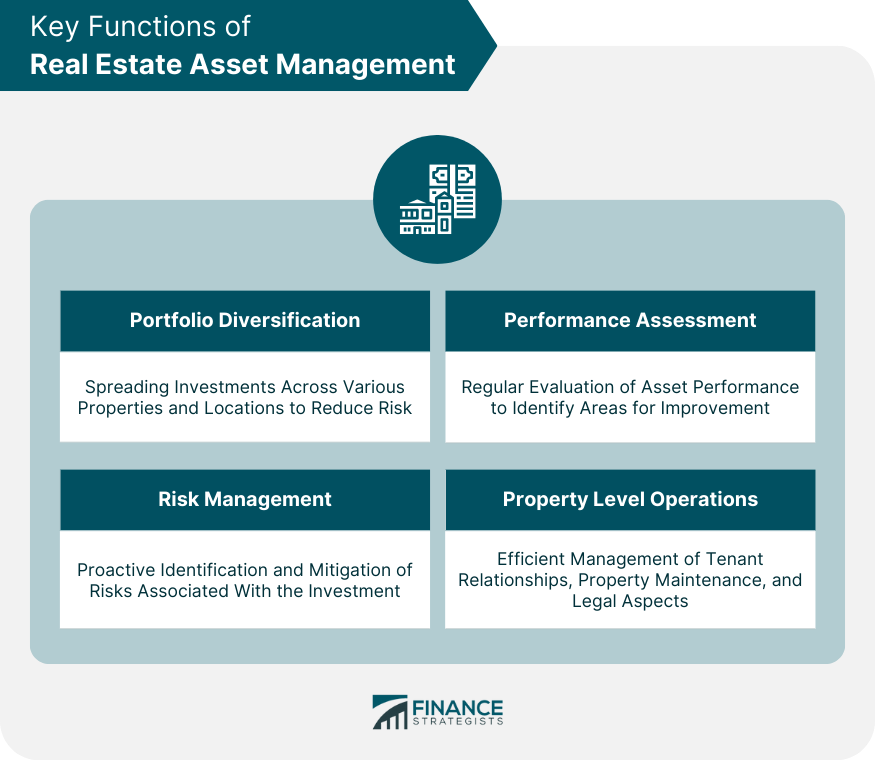
How Real Estate Asset Management Works
Asset Evaluation
Strategic Planning
Execution of Strategies
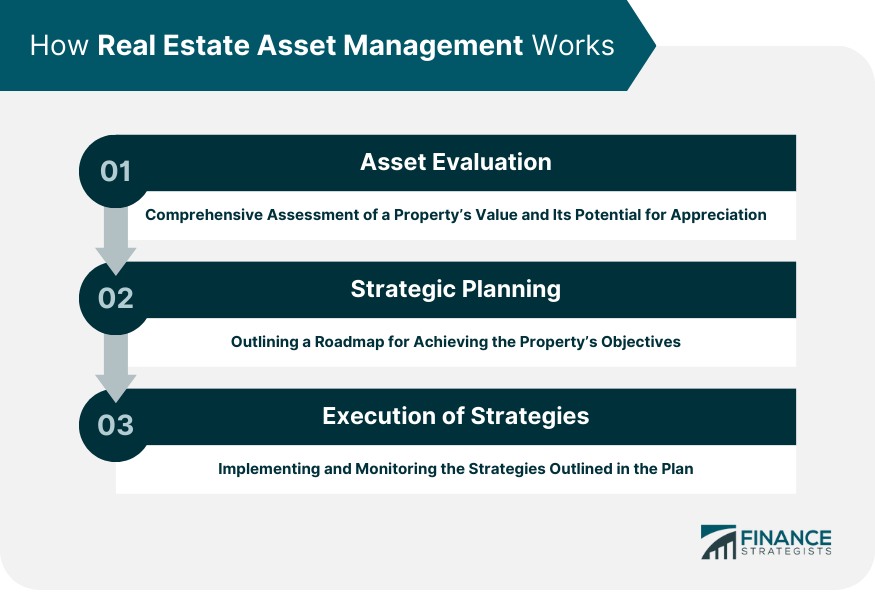
Types of Real Estate Assets
Residential Properties
Commercial Properties
Industrial Properties
Special Purpose Properties
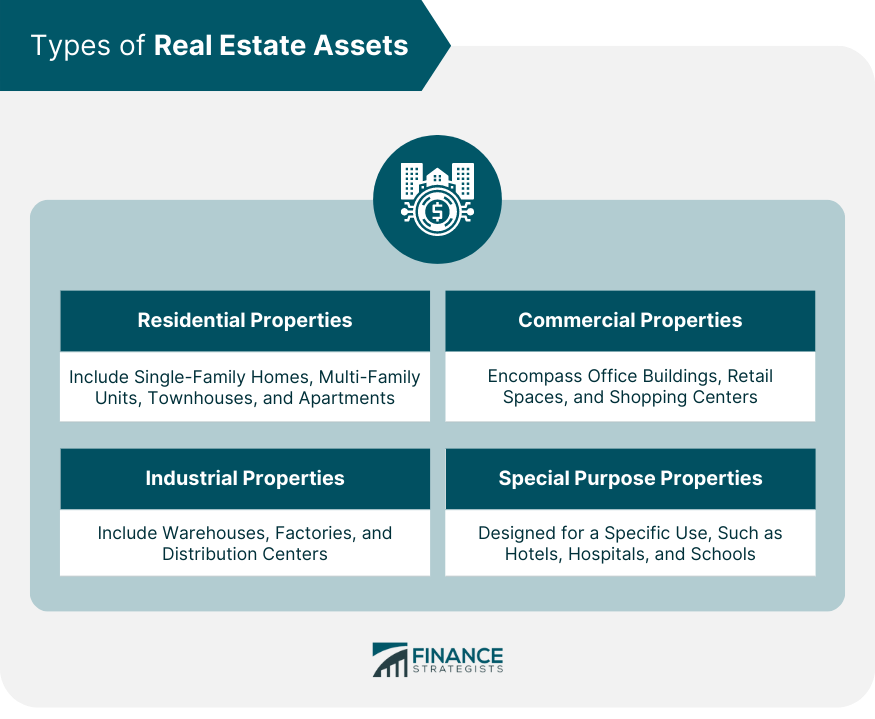
Benefits of Real Estate Asset Management
Property Value Enhancement
Revenue Streams Increase
Effective Risk Management
Risks and Challenges in Real Estate Asset Management
Market Fluctuations
Regulatory Compliance
Tenant Retention
Property Maintenance
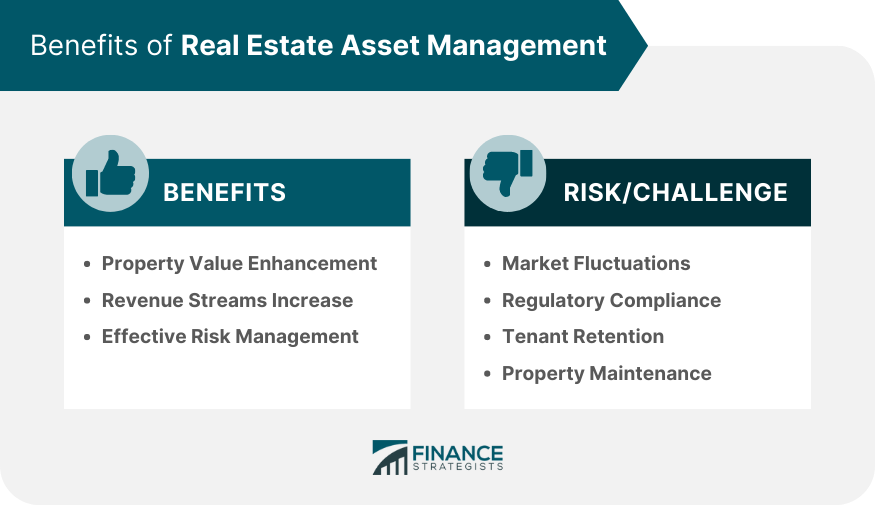
Best Practices in Real Estate Asset Management
Continuous Market Research
Proactive Property Management
Regular Performance Assessment
Effective Communication With Stakeholders
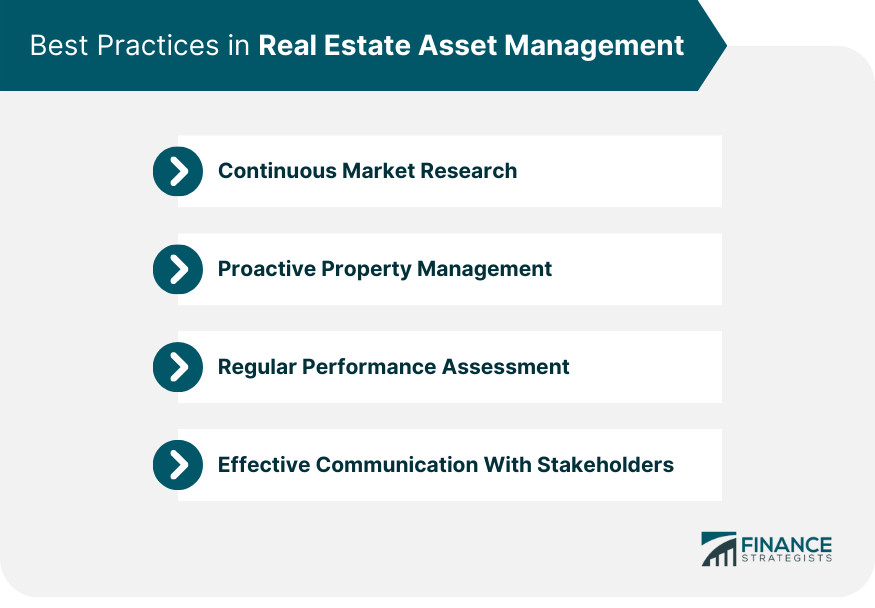
Final Thoughts
Real Estate Asset Management FAQs
Real estate asset management is the strategic management of a property to maximize its value and profitability over time.
The key functions include portfolio diversification, performance assessment, risk management, and property level operations.
It involves a three-step process: asset evaluation, strategic planning, and execution of strategies.
The types of assets include residential, commercial, industrial, and special-purpose properties.
The benefits include enhancing property value, increasing revenue streams, and managing risks effectively.
True Tamplin is a published author, public speaker, CEO of UpDigital, and founder of Finance Strategists.
True is a Certified Educator in Personal Finance (CEPF®), author of The Handy Financial Ratios Guide, a member of the Society for Advancing Business Editing and Writing, contributes to his financial education site, Finance Strategists, and has spoken to various financial communities such as the CFA Institute, as well as university students like his Alma mater, Biola University, where he received a bachelor of science in business and data analytics.
To learn more about True, visit his personal website or view his author profiles on Amazon, Nasdaq and Forbes.















